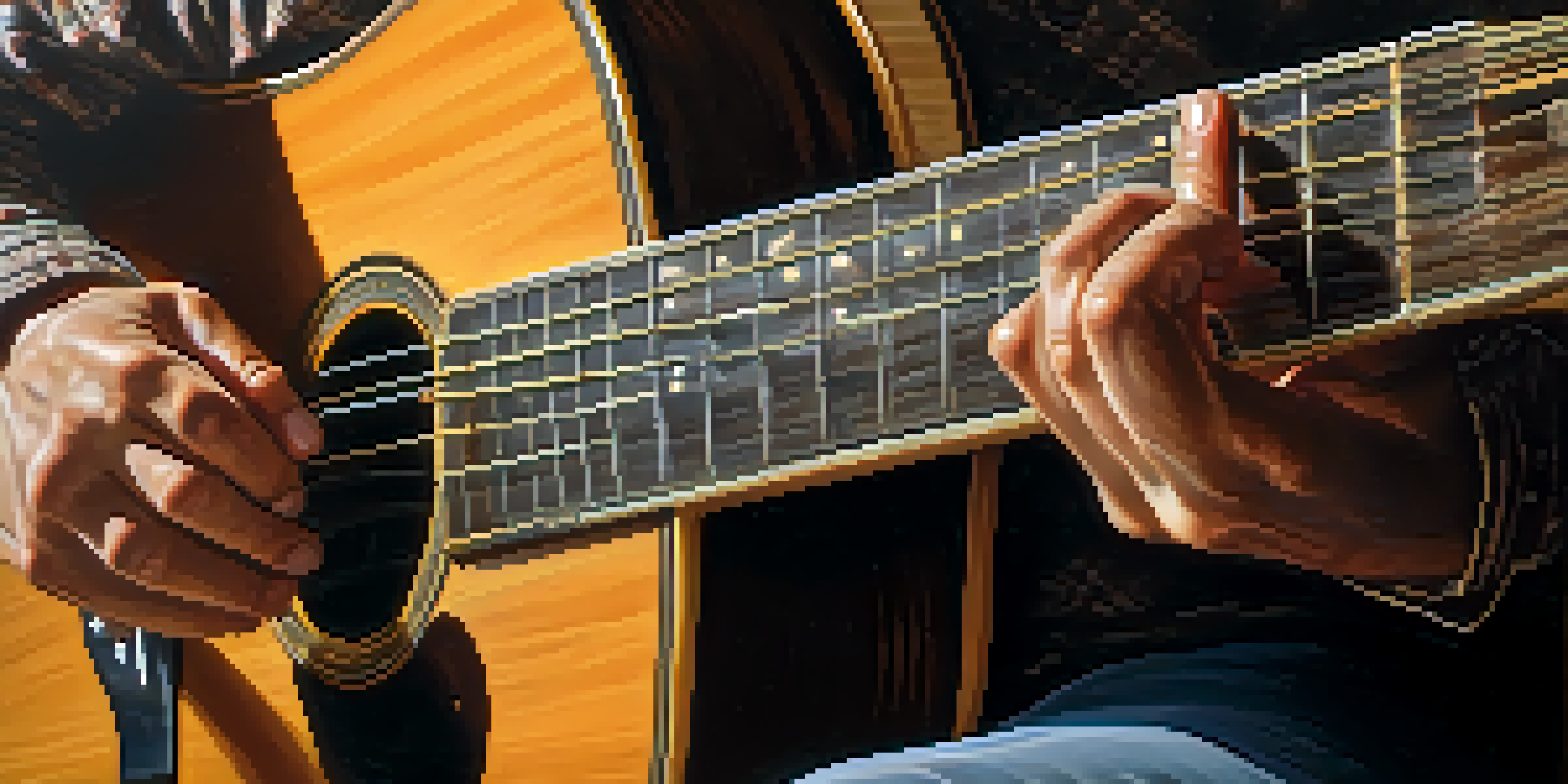The Myth of Perfect Pitch: Can You Learn Guitar Without It?

Understanding Perfect Pitch and Its Misconceptions
Perfect pitch, or absolute pitch, is the ability to identify or recreate a musical note without any reference tone. Many believe this skill is essential for musical success, but that's a common misconception. While it can certainly be helpful, it’s not a prerequisite for learning an instrument like the guitar.
Music is the shorthand of emotion.
In fact, most accomplished musicians do not possess perfect pitch. They rely on relative pitch, which is the ability to discern the relationships between notes. This skill can be developed through practice and listening, making it accessible to anyone willing to put in the effort.
So, while perfect pitch may sound impressive, it’s not the golden ticket to mastering the guitar. The focus should be on consistent practice, ear training, and understanding musical concepts that can help you improve your skills regardless of your pitch perception.
The Role of Relative Pitch in Guitar Playing
Relative pitch is like having a compass in a vast musical landscape; it guides you through the notes and chords you encounter. This skill allows you to identify intervals, which are the building blocks of melodies and harmonies. By honing your relative pitch, you can play along with others, improvise, and even create your own music.

To develop relative pitch, you can start with simple exercises, such as identifying the distance between two notes or singing scales. Apps and online resources can provide valuable tools for ear training, making it easier to practice anytime and anywhere. The more you work on these skills, the more intuitive your playing will become.
Perfect Pitch Isn't Essential
Many musicians succeed without perfect pitch, relying instead on relative pitch and consistent practice.
Ultimately, relative pitch enables you to connect with the music around you and enhances your overall guitar experience. It fosters creativity and confidence, proving that you don’t need perfect pitch to express yourself musically.
Mastering Guitar Techniques Without Perfect Pitch
Guitar playing involves a variety of techniques that can be mastered without the need for perfect pitch. From strumming patterns to fingerpicking, these skills can be learned through repetition and practical application. Focusing on these techniques can help you become a proficient guitarist, regardless of your pitch abilities.
The beautiful thing about learning is that no one can take it away from you.
For instance, learning chord shapes and progressions is essential for any guitarist. Once you understand these foundational elements, you can easily play your favorite songs by ear or by using tabs and chord charts. This method emphasizes the importance of practice over innate ability.
In summary, dedicating time to learn guitar techniques and practicing regularly will yield far better results than fixating on perfect pitch. Embrace the journey of learning and allow your skills to flourish through hands-on experience.
The Importance of Consistent Practice
Consistency is key when it comes to mastering any instrument, including the guitar. Setting aside time each day for practice, even if it's just 15-30 minutes, can lead to significant improvement over time. It's not about how long you practice, but how regularly you engage with the instrument.
As you practice, focus on different aspects of playing, such as technique, theory, and ear training. This well-rounded approach helps reinforce your skills and keeps your sessions engaging. Remember, every minute spent practicing builds a stronger foundation for your guitar playing.
Practice Beats Innate Ability
Regular practice and mastering guitar techniques are more important than having perfect pitch.
Ultimately, consistent practice will help you develop your musicality and confidence. With dedication and time, you can become a skilled guitarist without perfect pitch.
Using Technology to Enhance Your Learning
In today’s digital age, technology offers countless resources to help guitarists improve their skills. From mobile apps to online courses, these tools can assist in ear training, technique development, and even music theory. Embracing technology can make your learning process more enjoyable and efficient.
Many apps provide features like tuning assistance, chord libraries, and play-along tracks. These resources can help you practice in a structured manner, making learning feel less overwhelming. Plus, they often include gamified elements that can keep you motivated.
By leveraging technology, you can create a personalized learning experience that caters to your individual needs. This way, you can focus on the specific areas that require improvement, allowing you to progress at your own pace.
Learning from Others: Collaboration and Community
Joining a community of fellow guitarists can be incredibly beneficial for your growth as a musician. Whether it’s through online forums, social media groups, or local jam sessions, connecting with others can provide valuable insights and support. Learning from others can inspire you and help you overcome challenges.
Collaborating with other musicians can also enhance your understanding of music theory and ear training. Playing with others forces you to listen actively and adapt to different styles, which can improve your relative pitch. Plus, it adds an element of fun to your practice routine.
Community Enhances Learning
Collaborating with other musicians can provide support and improve your skills through shared experiences.
Ultimately, surrounding yourself with a supportive network of musicians can lead to faster progress and a richer learning experience. Don't underestimate the power of collaboration in your musical journey.
Embracing Your Unique Musical Journey
Every guitarist has their unique path, and it's essential to embrace your individual journey. Comparing yourself to others can lead to frustration, especially if you feel like you lack a particular skill like perfect pitch. Instead, focus on your growth and celebrate the progress you make along the way.
Remember, music is about expression and connection, not perfection. Your experiences, challenges, and victories shape your style and sound. By embracing your unique journey, you’ll find more joy in learning and playing the guitar.

In conclusion, you can absolutely learn guitar without perfect pitch. With dedication, practice, and the right resources, you can develop your skills and create beautiful music that reflects who you are as a musician.